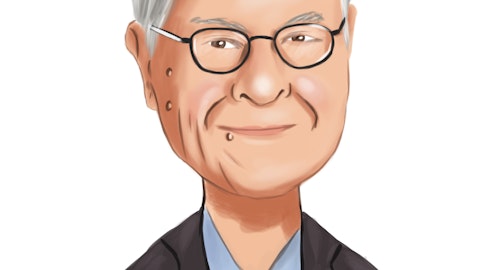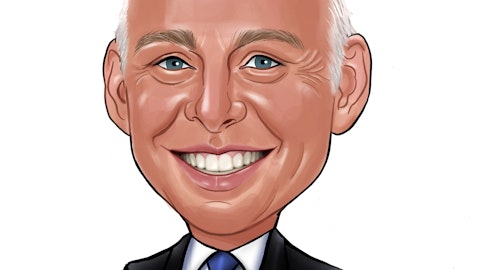Paul Huckfeldt: Yes, we’ve already seen some improvement there. We’re not incurring a lot of excess freight charges for goods that haven’t been on time and stuff like that, so we’re starting to see that progress, and we just need to see continued efficiencies first.
Anthony Lebiedzinski: Got it, okay. Thanks. Then a couple more questions, if I could. As far as on the cost side, ocean freight costs have certainly normalized. As far as the other costs across the business, what are you seeing there, whether it’s labor or domestic transportation? Can you just talk about what you’re seeing there?
Jeremy Hoff: I think the environment now is what I would call much more stable. Before, you were getting daily increases, whether it be foam, whether it be plywood, whether it be whatever you’re talking about, and now there’s a much more stable environment. To your point, obviously the freight–the ocean freight particularly is coming way down. Now as we’ve said, I think before, it’s difficult to quickly take advantage of that due to the fact we have the contracts in place and we’ve renegotiated a lot of our contracts, but that’s a continuous push from our side to realize the benefits of that lower ocean freight, on top of the fact that everything you shipped into your warehouse still had a lot of the higher cost.
Anthony Lebiedzinski: Mm-hmm, okay. Got it. Then as far as your ability to gain market share, you talked about benefiting from portfolio, you’re moving to a new showroom next year in High Point. What are some of the other things that you think will enable you to gain market share? And also one of your competitors, Lane Furniture, just abruptly shut down. Just wondering if you think that could be an opportunity for you to also gain share from that.
Jeremy Hoff: I’m going to start with the last part of that. Absolutely that category, there’s definitely a hole in the marketplace for what they were doing, and so yes, I think once–there’s a lot of product out there from them exiting overseas and factories and whatnot, that will be interesting getting through a little bit of a bottleneck in that, what they have going on over there. But after that, I believe there is an opportunity. As far as where we think we’re going to really take advantage of our growth opportunities, Sunset West is one big part of that. We acquired that company because we see this huge opportunity to put our operational scale on their business and be able to drive that east of the Mississippi – they were pretty west coast-centric, so we’ve been able to already expand that throughout the country.
Also with Savannah, they’ll have a distribution model that’s freight-friendly, if you will, on that part of the country as well, so there’s a lot of opportunity in the outdoor category. Portfolio, you know, it’s going to take time, but we already had a really good High Point Market that we believe is going to turn into some pretty significant revenue on the HMI side and diversifying that customer base as well. Moving into Showplace, usually you say, well, you’re just moving into another showroom, but we’re moving into a showroom that’s going to give us a significant multiplier of audience that we haven’t had before. It’s easy to get in the mindset that, well you know, we’re a fairly large furniture company and all these customers know who we are, but being on the 10th floor in Commerce, where we were, did not enable us to–our visibility just wasn’t where we wanted it to be, so this is a real opportunity for us to really show a whole new audience who we are, which is a great opportunity and we believe it’s a great revenue growth opportunity.
Then lastly, speed, we’re working on the time we get an order to how fast we can ship it and being in stock, and all the things that matter as far as getting turns, and we believe that’s going to have a significant impact to our revenues as well.



